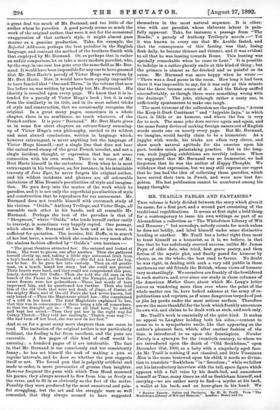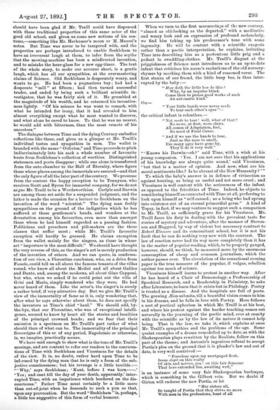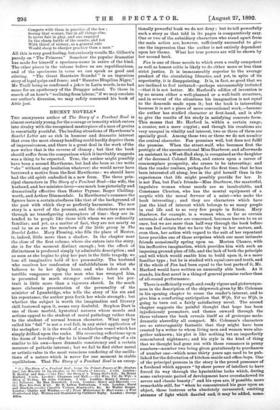MR. TRAILL'S FABLES AND FANTASIES.* THIS volume is fairly divided
between the story which gives it its name, for a first part, and a second part consisting of the traditional republications. It seems at first sight a bold thing for a contemporary to issue his own writings as part of so Alexandrian a collection as "The Whitefriars Library of Wit and Humour ; " but nowadays, nobody counts for much unless he does act boldly, and label himself under some distinctive heading or another. Mr. Traill has a better right than most to treat himself as a humorist, as it is, we believe, in that line that he has sedulously courted success, unlike Mr. James Pun of older date, who tried, first grave poetry, and then fiction of the mystic plot, and finally posed for humour by choice, as, on the whole, the best road to favour. No doubt he was right, in dealing with such a very odd public in those matters as our old friends the British, whose views of humour vary so startlingly. We ourselves are frankly of the bewildered in such matters, and, ever since our study in these columns of the American Mother Goose, about which Mr. Lang's letter leaves us wondering more than ever where the point of the whole matter can lie, have looked askance at the army of re- publications and reprints, as if some dangerous torpedo of jest or jibe lay perdu under the most serious surface. Therefore are we the more thankful for the book which frankly announces its own wit, and claims to be dealt with as such , and such only.
Mr. Trail's work is essentially of the quiet kind. It makes no appeal to Laughter holding both his sides,—content to rouse us to a sympathetic smile, like that appearing on the author's pleasant face, which, after another fashion of the time, is introduced to us upon the frontispiece. Number Twenty is a synonym for the twentieth century, to whom we are introduced upon the death_ of "Old Seeklehana," upon December 31st, 1900, as a baby with a singularly aged face. As Mr. Trail is nothing if not classical, and little Vicesimus /Eon is the name bestowed upon his child, it needs no divina- tion to translate " Seekleham "in " Steculum ; " while we follow out his introductory interview with the tall, spare figure which appears with a full voice by his death-bed, and announces himself as Time, many times as old as Seekleham himself, and carrying—we are rather sorry to find—a scythe at his back, a wallet at his back, and an hour-glass in his hand. We
• Number Twenty Fables and Fantasies. By H. D. Traill. From "The Whitefriare Library of Wit and Humour." London : Henry and Co.
should have been glad if Mr. Traill could have dispensed with these traditional properties of this same actor of the good old school, and given us some new notions of his cos- tume,—something like Mr. Herkomer's moon or M. Maurel's notes. But Time was never to be tampered with, and the properties are perhaps introduced to enable Seekleham to have an irreverent laugh at them, to infer from the scythe that the mowing-machine has been a misdirected invention, and to mistake the hour-glass for a new egg-timer. The text of the whole story, to make our account short, is a gentle laugh, which has all our sympathies, at the overmastering claims of Science. Old Seeklehanz is desperately weary, and wants to go. He had been a pugnacious boy ; had had a desperate " mill " at fifteen ; had then turned successful trader, and ended by being such a brilliant scientific in- vestigator, that he was fairly sick of it. He grumbled at the magnitude of his wealth, and he esteemed his inventive- ness lightly. "Of his science he was wont to remark, with what he intended for irony, that it had revealed to him almost everything except what he most wanted to discover, and what alone he cared to know. To that he was no nearer, he would add with bitterness, than the most remote of his ancestors."
The dialogue between Time and the dying Century embodies reflections like these, and gives us a glimpse at Mr. Tmill's individual tastes and sympathies in men. The wallet is branded with the name" Oblivion," and Time proceeds to pitch indiscriminately into his sack a whole number of favourite busts from Seekleham's collection of worthies. Distinguished statesmen and poets disappear ; while one alone is transferred from the ante-chamber to the Hall of Eternity, where figure those whose places among the immortals are assured—and that the only figure of all the later part of the century. We presume from the context the happy exception to be Tennyson, who receives Scott and Byron for immortal company, for we do not argue Mr. Trail to be a Wordsworthian. Carlyle and Darwin are among those set aside for a suspended judgment, and the latter is made the occasion for a lecture to Seekleham on the invention of the word "scientist." The dying man feebly sympathises on the ground of the indignities which he has suffered at those gentlemen's hands, and wonders at the devastation among his favourites, even more than amongst those whom he had himself regarded as a passing fashion. Politicians and preachers and pill-makers are the three classes that suffer most ; while Mr. Trail's favourite exception will hardly be guessed. He claims exemption from the wallet mainly for the singers, as those in whose art " imposture is the most difficult." We should have thought the very reverse of this, as the singer's art is merely production of the invention of others. And we can quote, in confirma- tion of our view, a Florentine coachman, who, on a drive from Fiesole, could tell us all about the famous tenants of the villas round, who knew all about the Medici and all about Galileo and Dante, and, among the moderns, all about Gino Capponi, but who, when we asked if he could point out the villa of Grisi and Mario, simply wondered who they were. He had never heard of them. Like the actor's, the singer's is surely a rather brief, if very attractive day. But we give Mr. Trail's view of the immortality of fame as it is, only wondering that, after what he says otherwise about them, he does not specify the inventors as Time's chief "haul." We should add, by- the-bye, that our Florentine, who was of exceptional intelli- gence, seemed to know by heart all the stories and localities of the principal crowned heads ; and we fear that their omission is a specimen on Mr. Trail's part rather of what should than of what can be. The immortality of the principal Sovereigns of this or of any period, Napoleonic or otherwise, is, we imagine, practically secure.
We have said enough to show what is the tone of Mr. Trail's musings, and are content to refer our readers to the conversa- tions of Time with Seekleham and Vicesimus for the details of the view. It is, no doubt, rather hard upon Time to be informed by the dying man that he is only a form of the sub- jective consciousness ; but his revenge is a little terrible :—
Why,' says Seekleham ; Kant, before I was born--2 Yes ; and cant till the day of your death, apparently,' inter- rupted Time, with an impatience which bordered on the dis- courteous." Father Time must certainly be a little more than out-of-joint when he descends to such a pun as that, upon any provocation. But the word " Seekleham " is, perhaps, a little too suggestive of this form of verbal humour.
When we turn to the first murmurings of the new century, "almost as old-looking as the departed," with a meditative and weary look and an expression of profound melancholy, we find him taking up his predecessor's tone with some ingenuity. He will be content with a scientific exegesis rather than a poetic interpretation, he explains, irritating Time into describing him as a portentous little prig and a pedant in swaddling-clothes. Mr. Trail's disgust at the priggishness of Science next introduces us to an up-to-date infant that criticises his nurse's recitations of the old nursery- rhymes by mocking them with a kind of reasoned verse. The first stanza of our friend, the little busy bee, is thus inter- rupted by the baby :—
" How cloth the little bee do this ?
Why, by an impulse blind. Cease then to praise good works of such An automatic kind."
On- " Your little hands were never made
To tear each other's eyes "-
the critical infant is relentless,— " Not made to tear well, what of that ?
No more, at first, were claws. All comes of Adaptation, fool, No need of Final Cause.
"And if we use the hands to tear, Just as the nose to smell, Ere many ages have gone by, They'll do it very well."
"Knows his Darwin—eh ? ' said Time, with a wink at his young companion. Yes. I am not sure that his applications of his knowledge are always quite sound,' said Vicesimus, but that is a matter of opinion. And now, what are his moral sentiments like ? Is he abreast of the New Humanity ? ' " To which the baby's answer is in defence of vivisection as against hunting, as being as useful and not more cruel ; and Vicesimus is well content with the seriousness of the infant as opposed to the frivolities of Time. Indeed, he objects to considering himself as connected with Time at all, preferring to look upon himself as " self-caused ; as a being who had sprung into existence out of an eternal primordial germ." A kind of
Topsy, in fact, if we may venture to suggest such a comparison to Mr. Traill, as sufficiently grave for his Vicesimus. Mr. Traill faces his duty in dealing with the prevalent taste for stories of mystery and adventure, after the manner of Steven- son and Haggard, by way of violent but necessary contrast to Robert Elsniere and its concomitant school, but it is not his fault that he can do nothing very new with the contrast. The law of reaction never had its way more completely than it has in the matter of popular reading, which, to be properly gauged, however, should, we think, be measured more by the enormous consumption of cheap and common journalism, which the author passes over. The circulation of the sensational evening paper is the true measure of the popular, if vulgar, rebellion against too much of science.
Vicesimus himself learns to protest in another way. After he has heard of a Chair of Demonology, a Professorship of Spookical Research, and a Readership in Palmistry, he asks after Literature, to learn that it exists but in Philology. Poetry is treated as a disease. And the hospitals are fall of poets. The growing ./Eon submits, till a beautiful vision comes to him in his dreams, and he falls in love with Poetry. Here follows a sort of poetical aphorism in which Mr. Traill is at his best, and where his protest against the harder teaching comes out naturally in the yearning of the poetic mind, ever at enmity with the scientific as by the law of its nature it cannot help being. That is the law, we take it, which explains at once Mr. Trail's sympathies and the problems of the age. Some quaint examples of a drama remodelled up to date, as with the Shakespearian plays rewritten by the Realists, follow on this part of the theme; and Antonio's ingenious refusal to accept Portia's plea on the ground that it is pleader's law and out of date, is very well contrived :—
" Foreclose upon my mortgaged flesh. Issue elegit on this realty
Of skin and nerves, yea! on this fair demesne That here extended lies, awaiting writ,"
is an instance of some very fair Shakespearian burlesque, which is something in the Gilbert vein. But we doubt if Girton will endorse the new Portia, or let
"Her sisters all,
Be taught of Portia that they strive no more With men in the professions, least of all
Compete with them in practice of the law ; Seeing that woman, fair in all things else, Is never fair in play, and one engaged In the sharp battle of the courts, and hot With thirst of victory, as a general rule Would stoop to sharper practice than a man."
All this is very good fooling, but curiously recalls Mr. Gilbert's parody on "The Princess." Somehow the popular dramatist has made for himself a specimen-name in satire of the kind. The other pieces in the volume before us are republications, and of the specimens in verse we can speak as good and stirring. "The Great Baxstairs Scandal" is an ingenious story of legal quips and fence; and" Haustus Blupilius Niger," Mr. Traill being so confirmed a joker in Latin words, is no bad name for an apothecary of the Dragger school. To those in search of an hour's "reclining from labour," if we may emulate our author's diversion, we may safely commend his book of Attic jest.




































 Previous page
Previous page